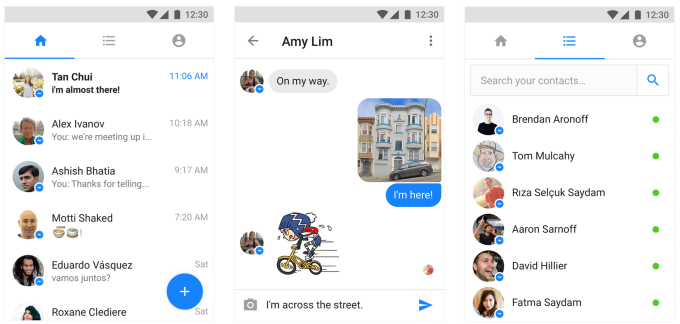Facebook’s data-conserving version of Messenger is no longer just for developing nations with slow networks. Now the Messenger Lite Android app is expanding to the US. Canada, UK, and Ireland after previously being available in over 100 mostly-developing countries. Messenger Lite packs most of the critical features of the app, but skips things like Messenger Day and selfie lenses that can drain data. There’s still no plan for an iOS version, though.
Previously, Messenger Lite was primarily for users in areas with weak bandwidth so the app would run faster. But now its expansion into Facebook’s top developed world markets makes it a tool for penny-pinching users like teenagers who want to avoid burning away their pricey megabytes but still stay in touch.
“We’re excited to bring Messenger Lite to Android users in 4 new markets including Canada, Ireland, the UK and the US” a Facebook spokesperson told TechCrunch. “Messenger Lite is a slimmed-down version of Messenger that offers the core features of the app, while giving everyone the opportunity to stay connected to their friends and family, regardless of device or quality of Internet connectivity.”
Facebook first launched Messenger Lite in October 2016 in five countries before its near global expansion in April when it hit 200 million users. The new rollout could help Facebook attract more teens to Messenger, both traditional and Lite. That’s because if downloading Lite makes them respond to more messages more quickly, it thereby encourages friends to stick with Messenger instead of defaulting back to SMS or iMessage, or straying to Snapchat.

The developing world has proven a challenge for Snapchat. Its video-heavy app doesn’t perform well in low-bandwidth conditions. And where there are friends who can’t use an app, people end up switching to one they can. For Messenger to keep expanding beyond its existing 1.3 billion users, it needs to do everything it can to be maximally accessible.
Though it may be harder to monetize Messenger Lite users, it’s worth it for Facebook since chat is the center of the mobile use case. If it can keep people on Messenger, it’s more likely to retain them in the rest of its family of apps.
